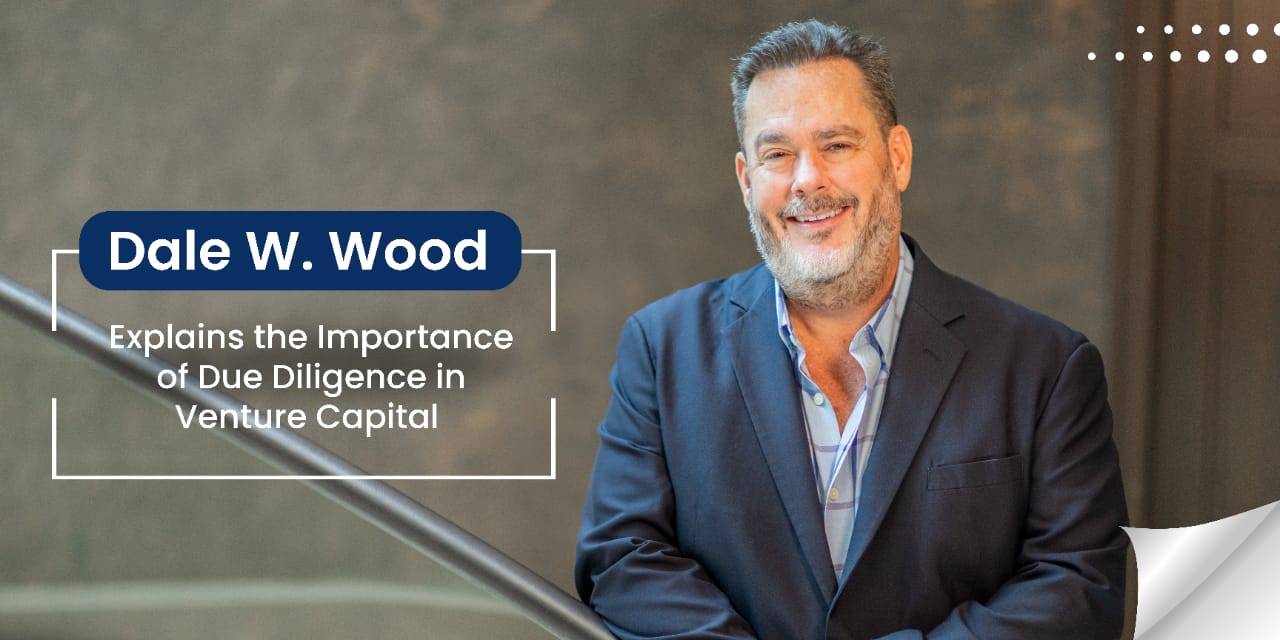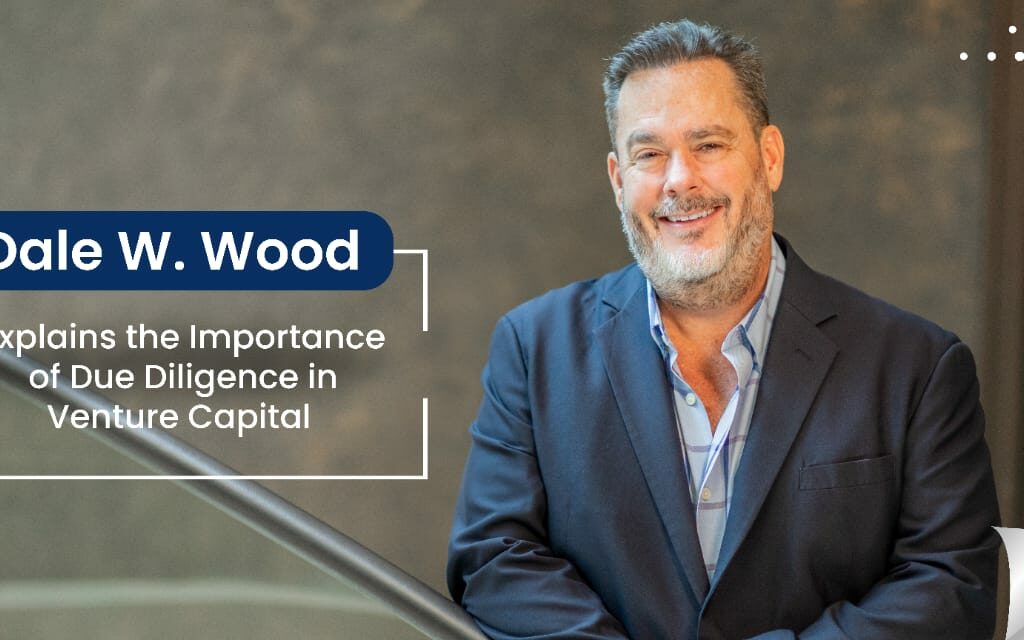As the catalyst for turning entrepreneurial vision into thriving enterprises, venture capital plays a fundamental role in the business ecosystem, and it couldn’t exist without one crucial piece that helps define success in the world of investment: due diligence.
According to entrepreneur and venture capitalist Dale W. Wood, Founder and Chairman of Dale Ventures Group of Companies, due diligence is a critical cog in the venture capital machine.
Wood has spent over 25 years building a distinguished portfolio of strategic investments founded upon mentorship. He doesn’t simply invest in businesses but rather in the promise of ideas and the potential of people, which can only be identified through a robust and important due diligence process, which he calls one of the most important in the business.
“I strongly believe proper due diligence is an invaluable asset,” Wood says. “It has helped me successfully navigate numerous investment opportunities and provides profound insights into an investment’s possible risk, viability and potential value.”
What is due diligence in venture capital?
Due diligence is the comprehensive evaluation of a potential investment before funds change hands. It is the meticulous exploration of various elements of the target company and involves assessing financial records, researching market dynamics, understanding legal implications and managing competencies.
Due diligence is indispensable in shaping investment decisions and mitigating risks for venture capitalists, and this granular approach gives investors an all-encompassing understanding of the budding company’s potential, enabling them to make better-informed decisions before dispensing capital.
Why is it essential for entrepreneurial success?
Initially, entrepreneurs may perceive the due diligence process as invasive scrutiny or a hurdle to securing funding.
“While that mindset is understandable, it’s important to look at this process from a different perspective and view due diligence as an opportunity to increase success rather than an obstacle to overcome,” Dale said.
Due diligence is more than just a one-way street that benefits the investor—it also serves as a valuable tool for entrepreneurs.
“By embracing due diligence, entrepreneurs can use the process as a mirror to reflect on their business plan, market positioning and financial health,” Wood added.
In-depth analysis and feedback from seasoned investors provide entrepreneurs with invaluable insights to strengthen their business model, improve their strategy and enhance operational efficiency. Due diligence can become an asset for entrepreneurs in their journey toward business success, but they must embrace the process without holding back.
The components of due diligence
The due diligence process isn’t a single linear path. It encompasses several crucial aspects of an enterprise, broadly put into the buckets of financial, market, legal and management due diligence.
These elements are vital in building a comprehensive picture of a prospective investment and contribute to a balanced and informed decision-making process.
Financial due diligence
Financial due diligence is crucial to understanding the company’s economic stability and growth potential. Venture capitalists dive deep into financial statements, income statements, cash flow analyses and other pertinent records, and evaluating these indicators provides them with a comprehensive understanding of the company’s fiscal health. A clear financial picture allows investors to understand a company’s viability as an investment opportunity appropriately.
Market due diligence
Market due diligence highlights the market and industry dynamics of the potential investment. Venture capitalists scrutinize the competitive landscape, the company’s unique value proposition and the growth opportunities in its sector. This analysis helps assess the attractiveness of the market and the company’s opportunity within it, both in the long and short term.
Legal due diligence
Venture capitalists also conduct audits to uncover legal and regulatory headwinds that the company may face. To safeguard their investment, venture capitalists identify potential legal risks and liabilities by examining contracts, licenses, intellectual property rights and legal compliance.
Management due diligence
Management due diligence assesses the management team’s capabilities and industry knowledge. Understanding the leadership’s ability to execute strategies, navigate challenges and adapt to evolving market conditions is vital to gauge an investment’s potential success. A company’s management must put the business first, be open to input and be willing to change course as the market demands.
Benefits of due diligence in venture capital
Due diligence brings numerous benefits to investors and entrepreneurs alike. By conducting thorough investigations and analyses, the information gathered in due diligence can make or break investment decisions and ultimately help to ensure long-term success.
Minimizing investment risks
Due diligence identifies and mitigates potential investment risks. Through meticulous analysis, venture capitalists can uncover hidden dangers, evaluate financial stability and verify market viability in this process. As a result, venture capitalists can make investment decisions that balance risks and rewards, aligning with their investment goals and settling them up for more successes than failures.
Maximizing investment returns
Adequate due diligence enhances the potential for high returns. Comprehensive analysis helps identify ventures with significant growth potential and further define a company’s place in the market. A clear correlation exists between diligent investigation and higher returns on investment, setting the stage for long-term growth and profitability.
Building trust and credibility
Due diligence builds trust between investors and entrepreneurs, laying the groundwork for a fruitful partnership. By participating openly and honestly in due diligence, an entrepreneur proves they’re a promising partner willing to do whatever it takes to make the investment fruitful without hiding any shortcomings. It also builds credibility in the venture capital industry as rigorous evaluations enhance a VC’s reputation for attracting quality entrepreneurs seeking funding.
Dale Wood’s approach to due diligence
Wood emphasizes thorough due diligence as a core aspect of his firm’s investment strategy. At Dale Ventures Group of Companies, due diligence begins with a commitment to comprehensive assessments.
A multidisciplinary team examines all aspects of a potential investment opportunity, including finance, market research, legal considerations and management evaluations. Dale Ventures’ rigorous due diligence process has resulted in successful investments across the technology, healthcare and e-commerce sectors. By prioritizing thorough vetting, Wood has built a strong track record and established trust with entrepreneurs.
“I attribute much of our companies’ successes to this critical process. I firmly believe that by doing the difficult but necessary work upfront, you make the next phases of the venture capital process even more efficient,” Wood said.
Conclusion
Due diligence is the cornerstone of venture capital success. Through this process, venture capitalists can mitigate risks, maximize opportunities and build solid foundations for business growth.
Leaders in the field, such as Dale Wood, exemplify this commitment to rigorous analysis and thorough due diligence, contributing to the evolution of innovative ventures into market-leading enterprises.


